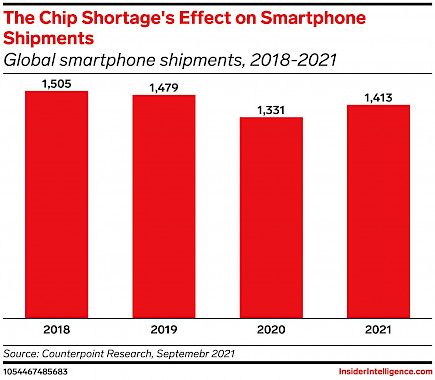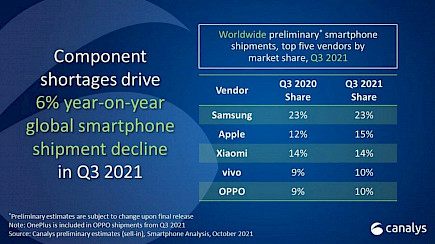
When iPhone 13 was released in September event of 2021, people all over the world thought that this new device would break another record by becoming a bestseller.
But, two months into 2021 and the sales of iPhones have taken a massive hit.
From the post-pandemic recession to global metal/ metalloid shortage and lack of interest from the users. The iPhone 13 has seen a steep decline in its sales.
According to the source, Apple had previously limited manufacturing of the iPhone 13 to up to 10 million devices owing to a global chip shortage, but it has recently notified vendors that such orders may not materialize.
As more and more iPhones remain unsold across stores all over the world.
The News:
Bloomberg News reported that Apple Inc has told its suppliers of parts that the demand for the iPhone 13 lineup has been slowed, citing sources familiar with the situation who indicated that some consumers have opted against purchasing the item that is difficult to find.
The company had previously reduced the production rate of iPhone 13 by as many as 10 million units as a result of an issue with the chip's supply. However, it had informed suppliers that these orders could not come through, according to the report.

Apple and its partners 3M Co, Broadcom Inc, and Advanced Micro Devices Inc did not immediately respond to Reuters' requests for comment.
A global crunch in chips first due to the booming demand for smartphones as well as personal devices during the coronavirus pandemic has affected the automotive sector and disrupted production at businesses ranging all the way from Apple to GM.
In October, Apple's Chief Executive, Tim Cook, warned that the effects of supply shortages, which resulted in the company losing $6 billion in sales during the fourth quarter of the fiscal year, would get worse in the holiday season and that a shortage of chips was affecting the majority of Apple's products.
The impact of Global chip shortage
According to a report via Bloomberg News, Apple has told component suppliers that it isn't expecting iPhone 13 series sales to rise even though the festive season and beyond like it had predicted earlier. The reason for the sluggish sales is thought to be the ongoing shortage of chips.

The company noted that customers are waiting with bated breath for iPhone 13 units to replenish their stock.
According to the report, Apple advised the suppliers of its products that "demand for this iPhone 13 lineup has weakened, according to people who are familiar with the subject, suggesting that some customers have decided not to purchase the item that is difficult to find."
The global shortage of chips has been a major issue for Apple extremely brutally since the announcement of the iPhone 13. Just a few days after the latest iPhone models were unveiled, Apple reportedly cut iPhone 13 production by 10 million units due to supply chain issues and a global shortage of chips.
With the most recent information coming out, the iPhone 13's fate is a bit disappointing.
The company has four models in the series, including the iPhone 13, the iPhone 13 mini, as well as the iPhone 13 Pro, the iPhone 13 Pro, and the iPhone 13 Pro Max.

The Cupertino-based tech company hoped to "make some of the deficit next year, as the supply of goods is expected to increase." However, this isn't happening. The report said that Apple is "now telling its vendors that these orders are unlikely to come through."
In light of the current situation, in which the company is restricted by the number of iPhone units that can be built using the available components instead of increasing demand, The report also stated the fact that Apple does not anticipate customers facing long wait times to keep their interest when the supply rises.
Apple has stopped revealing the number of iPhone units it sells each quarter, but based on the pattern, it's probable that Apple's revenues in the coming quarters will be significantly affected.
Previously Apple has lost $6 million due to chip shortage
It's not a secret anymore that the global shortage of semiconductor chips has affected Apple and other smartphone makers. Furthermore, we know that the production of the iPhone 13, MacBook, and iPad has suffered in some ways.
In the very first instance, since CNBC reported, Apple has failed to reach estimates. For those who want to put it in figures, Apple dipped 3% below Wall Street expectations in its extended-hours stock trading in the fourth quarter of the fiscal year, which runs from 2020 to 2021.
"We have had a very good performance despite greater than expected supply issues," Cook said to CNBC. "The supply limitations were caused by the chip shortages across the industry that have been mentioned often, as well as COVID-related manufacturing disruptions across Southeast Asia."
Tim Cook estimates that these delays related to the production of chips have cost the Cupertino company around six billion dollars in initially estimated revenue.
According to a Bloomberg article, Cook said Apple will be the hardest hit by the shortage of chips this Christmas season because it will be the beginning of the new fiscal quarter.
Although Cook anticipates a record for sales overall, which is expected to exceed the original $111 billion estimate, analysts have reduced their estimates from $120 billion down to $118.5 billion at present.
Winding-up
The last months of 2021 have not been great for Apple.
From being dethroned as the biggest company title by Microsoft to low sales Apple is now knee-deep in troubled waters. But, the tech giant has other methods panned out.
As it suspects the sales might again rise in the month of December due to the various Holiday Sales.





